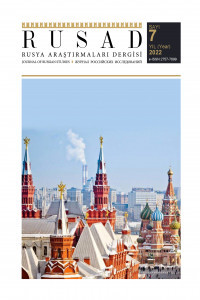Rusya Tarihindeki Olaylara İki Medeniyetli Yaklaşımı: 1917 yılı Şubat-Mart Aylarında İmparatorluğun Çöküşü
Rus Devrimi, medeniyet teorisi, iki medeniyetli yaklaşımı, Marksist Teori, kilise bölünmesi, kültürel Batılılaşma
Bicivilization Method and The Context Of Russian History: The Fall Of The Empire In February-March Of 1917
russian revolution, civilization theory, bicivilization method, marxists theory, religious split, cultural westernization,
___
- Гоголь Н.В. “Нужно проездиться по России (Из письма гр. Т…му). 1845”. Избранные места из переписки с друзьями. Полное собрание сочинений Н.В. Гоголя. т.8. 1952, 307-308.
- Ленин В.И., “Маевка революционного пролетариата”. Полное собрание сочинений В.И. Ленина, т.23. 1973, 296-305.
- Marx K.H. and F. Engels. Manifest der Kommunistischen Partei. London: 1848.
- «Путин назвал Россию отдельной цивилизацией», КоммерсантЪ, 17 мая 2020. URL: https://www.kommersant.ru/doc/4347719?from=hotnews (accessed data 25.05.2020).
- Данилевский, Н.Я. Россия и Европа: Взгляд на культурные и политические отношения славянского мира к германо-романскому. Спб.: Тип «Общ. Польза", 1871.
- Зубов, А.Б. История России, XX век: 1894-1939. М.: Астрель-АСТ, 2010.
- Кара-Мурза, С.Г. Гражданская война (1918 -1921) - урок для XXI века. М.: Эксмо: АЛГОРИТМ, 2003.
- Кара-Мурза, С.Г. Крах СССР. Кто виноват? М.: Алгоритм, 2016.
- Керсновский, А.А. История Русской Армии в 4-х тт. (1933-1938). Т.4. М.: Голос, 1994.
- Куртуа, С., и др. Чёрная книга коммунизма: преступления, террор, репрессии М.: «Три Века Истории», 1999.
- Мартынов, Е.И. Царская армия в февральском перевороте. Политика и стратегия. М.: Изд. дом «Финансовый контроль», 2003.
- Никонов, В.А. Код цивилизации. Что ждет Россию в мире будущего? М.: ЭКСМО, 2020.
- Пайпс, Р. Русская революция. Книга 1. Агония старого режима 1905—1917. М.: изд. дом Захаров, 2005.
- Сидоров, А. Л. Финансовое положение России в годы первой мировой войны, 1914—1917 гг. М.: Изд-во АН СССР,1960.
- Сталин, И.В. Вопросы ленинизма. 11 изд. М.: 1945.
- Струмилин, С. Г. Заработная плата и производительность труда в русской промышленности за 1913-1922 г. М.: Вопросы труда, 1923.
- Струмилин, С. Г. Очерки экономической истории России и СССР. М.: Наука, 1966.
- Струмилин, С.Г. Проблемы экономики труда. М.: Наука, 1982.
- Hauschofer, K. Grenzen in ihrer geographischen und politischen bedeutung. Berlin–Grunewald, 1927.
- Huntington, S.P. The Clash of Civilizations and the Remaking of World Order. New York: Simon and Schuster,1996.
- Mackinder, H.J. Democratic Ideals and Reality. New York: Holt, 1919.
- Mahan, A. T. The Influence of Sea Power Upon History, 1660—1783. Boston: Little, Brown & Co., 1890.
- Rükkert, H. Lehrbuch der Weltgeschichte in organischer Darstellung. v.1. Leipzig: 1857.
- Spengler, O.–A. G. Der Untergang des Abendlandes. Wien: Braumüller, 1918 (Band 1: Gestalt und Wirklichkeit); München: C. H. Beck, 1922 (Band 2: Welthistorische Perspektiven).
- Spykman, N.J. America's Strategy in World Politics: The United States and the Balance of Power. New York: Harcourt, Brace and Company, 1942.
- Toynbee, A. J. Study of History. London, New York, Toronto: 1934-1961.
- Wallerstein, I. The Modern World-System. vol. IV: Centrist Liberalism Triumphant, 1789—1914. Berkeley-Los Angeles-London: University of California Press, 2011.
- Yayın Aralığı: Yılda 2 Sayı
- Başlangıç: 2019
- Yayıncı: Tekin Aycan TAŞCI
Gürcistan’daki Rus “Yumuşak Gücü’nün” Tarihi (XIX.-XX Yüzyıl)
Altın Orda Egemenliği Altında Bir Knez: Moskova Knezi Daniil Aleksandroviç ve Zamanı (1261-1303)
Bulgar Sorunu Bağlamında Rus Büyükelçi Nelidov’un Faaliyetleri Üzerine
1806-1812 Osmanlı-Rus Savaşı’nda Pehlivan İbrahim Ağa’nın Rolü
Rus Çarlığı’nın İdeolojik Baskı Aygıtına Bir Örnek: Altay Dini Misyonu’nun Eğitim Faaliyetleri
Rusya'nın Siber Güvenlik ve Siber Espiyonaj Politikalarının Analizi
Hasan ACAR, Mustafa PEKCANDANOĞLU
